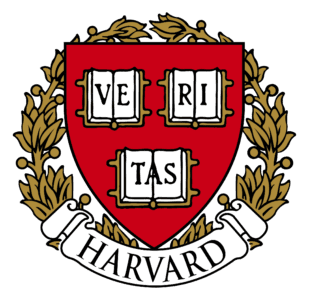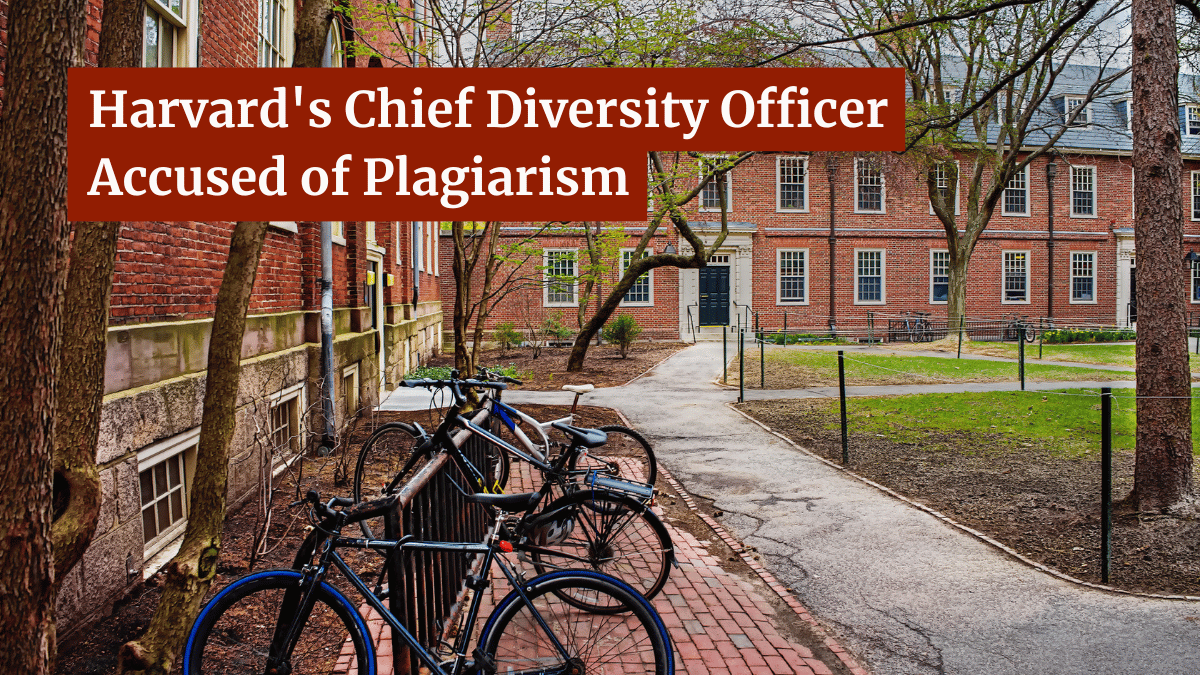Harvard’s Chief Diversity Officer Accused of Plagiarism

Earlier this week, the Washington Free Beacon reported on a new set of plagiarism allegations targeted at a Harvard official.
The latest allegations look at the works of Sherri Ann Charleston, the school’s chief of diversity. They accuse her of plagiarism both in her dissertation and a published article that she co-authored with her husband, who was the primary author, and a third coauthor, Jerlando F. L. Jackson.
The allegations come less than a month after a similar set of plagiarism allegations forced the resignation of then-Harvard president Claudine Gay. Though the allegations against Gay were circulated in October, she became a target following her testimony before the House Committee on Education and the Workforce, which was seen as not taking a strong enough stance against antisemitism on campus.
The day after Gay’s resignation, a similar set of allegations were leveled against Neri Oxman, the wife of Bill Ackman, a billionaire CEO who was a staunch critic of Gay’s. Ackman has since threatened to perform similar checks on all current MIT faculty members, which would involve examinations of the work of over 1,000 people.
In that light, the allegations against Sherri Charleston are the latest in this back and forth targeting of politically divisive academics. However, that does not mean that the allegations are erroneous or false, just that they must be examined closely and in as neutral of a light of a possible.
To that end, there are two separate sets of allegations that we must look at, the first involving a 2014 published paper that Sherri Charleston is co-author of.
Allegations of Duplicative Publishing
The first set of allegations deal with a 2014 article published in the Journal of Negro Education. On that article, Sherri Charleston was listed as a co-author, along with collaborator Jerlando F. L. Jackson. Sherri’s husband, Lavar Charleston, is the lead author.
However, the article seems to borrow substantial amounts of text and contain the same research as a 2012 article published in the Journal of Diversity in Higher Education. For that article, Lavar Charleston was listed as the sole author. The work does not clearly disclose that work is duplicated, nor does it explain what contributions Sherry and Jackson made to warrant authorship on the article.
To make matters worse, according to the Boston Globe, the article also appears to use text from a paper that was presented at a Pittsburgh conference for women in engineering.
Setting aside those most recent allegations (which I have not had a chance to independently evaluate), this one is a complicated one to examine for several reasons.
First, Lavar Charleston is listed as the primary or sole author on both papers. Though, obviously, all authors on a paper have some shared responsibility for it, the primary author is typically the first to take blame or be asked to address issues of integrity.
Second, this deals with duplicative publication, sometimes referred to as “double dipping.” This is a controversial and divisive topic within academia and there are times where it is seen as acceptable.
That said, this case does not seem to meet any reasonable standards for duplicative publication, if for no other reason than there is no clear indication that the work was repeated. However, it is unclear whether the journals agreed to this.
To that end, I have three simple questions to ask:
- How is the duplicative publication justified and was it agreed to beforehand?
- If it is justified, why was it not made clear in the paper itself?
- What contribution did the other two authors, including Sherri Charleston, make to the paper to warrant their inclusion?
The lack of clear markings that the paper was duplicative has me deeply worried and indicates that this may be an instance of duplicative publication combined with a guest/ghost/gift authorship to the other authors. That would represent a serious infraction of research integrity, which would be especially bad for Sherri Charleston as it is her only peer-reviewed publication.
To that end, we must turn our attention to Sherri Charleston’s dissertation, which may be where the clearer issues lie.
Examining the Dissertation
Sherri Charleston’s dissertation was submitted to the University of Michigan in 2009. However, an examination both by the Free Beacon and the Boston Globe found that it contained extensive passages taken from other sources. This included one paragraph that copied 80 of 85 words from the original source.
Though, for the most part, the sources were cited in the footnotes, there was no indication that the text itself was copied. In that regard, the allegations are like what was brought forth against both Gay and Oxman, the use of language without indicating that the text is quoted verbatim or near verbatim.
As with the Oxman and Gay cases, the allegations are more than strong enough to warrant an investigation. As we have seen many times before with these kinds of allegations, the initial findings are likely incomplete and additional digging can and does spot new issues. For example, with the Oxman case, there were multiple rounds of allegations for the same work, namely her dissertation, as new issues were found.
Harvard, undoubtedly, will need to do a thorough analysis. However, as we saw with Gay, their process seems to have gaps and, with her, the school missed some obvious and significant issues in Gay’s previous work. Still, given that Sherri Charleston only has two works of import, the dissertation and paper, a quick and thorough analysis of both should be very achievable.
That said, as we discussed previously with Oxman’s story, it is highly unlikely that her degree will be revoked, simply because schools rarely investigate these kinds of plagiarism issues due to how burdensome the investigations are and how litigious they often become. If there is such an investigation, it would, most likely, end in corrections being filed for the dissertation and Sherri Charleston keeping her degree.
This puts the focus squarely on Harvard and what they do next. With a formal complaint filed, an investigation is all but inevitable. The next step is to wait for the outcome of that investigation and see if they handle it with greater transparency and thoroughness than they did Gay’s.
Bottom Line
As I have said before and repeated in multiple interviews, I worry deeply about the weaponization of plagiarism, in particular when it is targeting academia.
While I agree completely that public scrutiny is needed and that academia has serious issues that it either has proven unwilling or unable to address, these attacks are not trying to improve research or academic integrity, they are trying to score political points. They choose their targets not based on who is important or how serious their infractions are, but on who is politically expedient.
That said, the intent of the investigation does not necessarily mean that the findings are without merit. Here, the findings have at least some merits.
Though the duplicative publication issues are complicated due to the nature of them being authorship issues rather than traditional plagiarism ones, there are tough questions to be asked and the appearances right now definitely skew toward authorship and publication manipulation with the intent of getting all involved additional publication credits.
Given that it is also Sherri Charleston’s only publication, it is especially damning for her, doubly so if it does end up being retracted for being duplicative, which is a very real possibility.
As with Gay and Oxman, the allegations against her dissertation also point to serious issues that require, at the very least, a thorough, expedient, and transparent examination by an independent party. Though it is unlikely the University of Michigan will investigate too deeply, at least following the history of similar cases I have been involved with, Harvard almost certainly will.
Though it is impossible to predict the outcome of this, Sherri Charleston is in an exceedingly difficult position. Not only is her position under attack for political reasons, but her two most important works for supporting her qualifications, her dissertation, and her lone published paper, are both under reasonable scrutiny.
Given that Claudine Gay resigned when much less of her work history was under scrutiny, it may be the only practical option left for Sherri Charleston too.
However, it is important to remember that these issues are both nuanced and complicated. While I agree that Harvard has not done a great deal to bolster confidence in their process, it is a process that still needs to play out.
So, I am reserving further judgment until the full facts are known. The question is whether it will be Harvard or another third party that publishes them.
Want to Reuse or Republish this Content?
If you want to feature this article in your site, classroom or elsewhere, just let us know! We usually grant permission within 24 hours.
